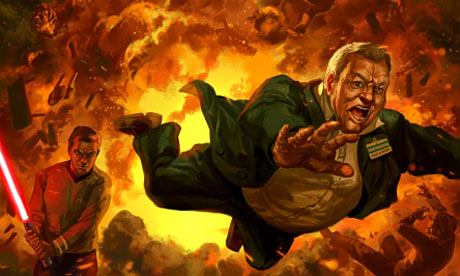
Jeff Burk's Shatnerquake is the story of William Shatner. Yes: Wiliam Shatner. All of the characters he has ever played are suddenly sucked into our world on a mission to hunt down and destroy the real William Shatner. As one Amazon reviewer insightfully states, if you have ever wondered what would happen if William Shatner came face to face with the incarnation of every character he ever played, then "this is the book for you". It is also, undeniably, Shatnertastic.
Shatnerquake is a comparatively mild example of the Bizarro fiction genre. Bizarro fiction defines itself as the literary equivalent of the cult film section in a video store, taking inspiration from films such as Repo Man and Eraserhead. It aims to satisfy the demands of readers who are looking for weird, in the same way other readers go looking for action or romance. Starting a decade ago with the work of indie publishers Raw Dog Screaming Press, Afterbirth Books and Eraserhead Press, the genre now has over a dozen small publishers, its own convention and an increasing cult status among readers and writers who know weird when they see it.
If the history of Bizarro fiction is ever long enough to look back on, it's likely that Carlton Melick III will loom large over the retrospective. If Shatnerquake typifies the screwball exuberance of Bizarro fiction, then Carlton Melick III exemplifies the intelligence and wit that lurks between its lurid covers. In a genre where crude titles are an art in themselves, Melick is a true artist. Satan Burger, The Cannibals of Candyland, Adolf in Wonderland, War Slut, The Haunted Vagina, The Faggiest Vampire, The Baby Jesus Butt Plug, and my personal alliterative favourite, Warrior Wolf Women of the Wasteland. These are titles that fail to offend only because of their blatant offensiveness, and illustrate Bizarro's fascination with the vulgar, smutty, distasteful and crude.
It's a fascination that you might feel has been taken too far with Cameron Pierce's outrageously titled Ass Goblins of Auschwitz. The book tells the story of a fantasy world where black snow falls in the shape of swastikas, and a nightmarish, fairytale version of the Auschwitz prison camp. Prisoners 999 and 1001, conjoined twin brothers, are forced to endure the sadistic tortures of the Ass Goblins and work all day constructing bicycles and sex dolls out of dead children as they plan their escape. Ass Goblins is deliberately distasteful and offensive, an exercise in identifying the boundaries of common decency and overstepping them, over and over again, and might see Cameron Pierce lynched by rampaging mobs of Daily Express readers if he ever ventures into the UK. In an era when very little remains shocking, Pierce might have actually managed to create a genuinely disturbing work of fiction, the literary equivalent of Schindler's List rewritten by the Marquis De Sade and filmed as a Tim Burton animated feature.
For a more charming (if less fascinatingly titled) entry to Bizarro fiction try Cursed, the second novel by Jeremy C Shipp. Here you can meet Nicholas, a man who believes he has been cursed to be slapped every day. And Cicely, Nicholas's love interest, who is convinced that the fate of the world depends on never putting the tennis ball down. Together they seek out other victims of the curse, and confront the malevolent Pete. Cursed is like an episode of Seinfeld as written by Chuck Palahniuk: a clever, funny, meaningful and dark comedy that will take you by surprise. If I was an editor looking for the first break-out hit from the Bizarro genre, Jeremy C Shipp is where I would stake my six-figure advance.
When I first stumbled across Bizarro fiction a few months ago, I wondered if there was any really decent writing in the genre, assuming from its trashy aesthetic that catchy titles might be the pinnacle of its achievements. Bizarro fiction is by turns stupid, repulsive and crude. But at its best, it is also intelligent, compelling and well-written. Any literary genre that can be both bad and good at the same time is worth watching.

